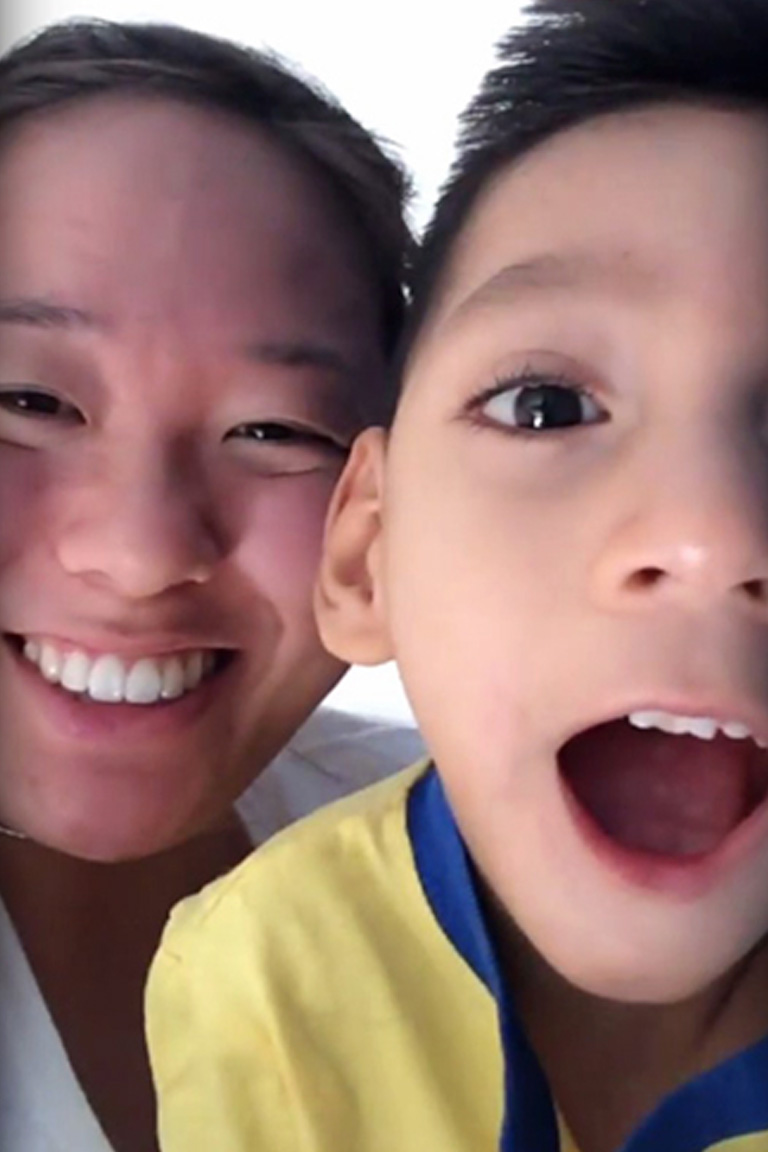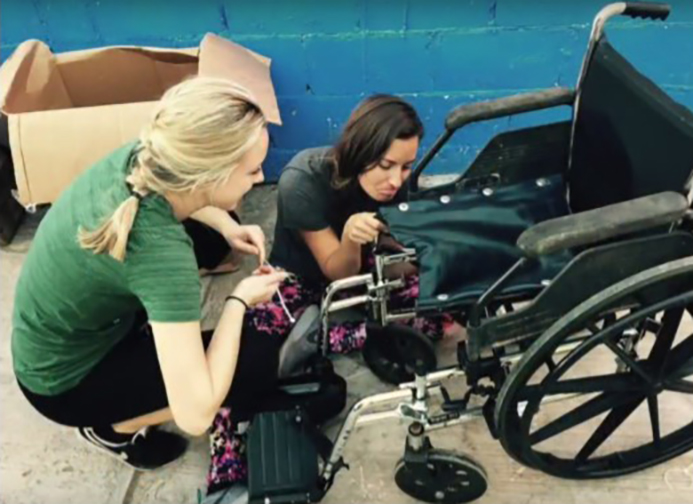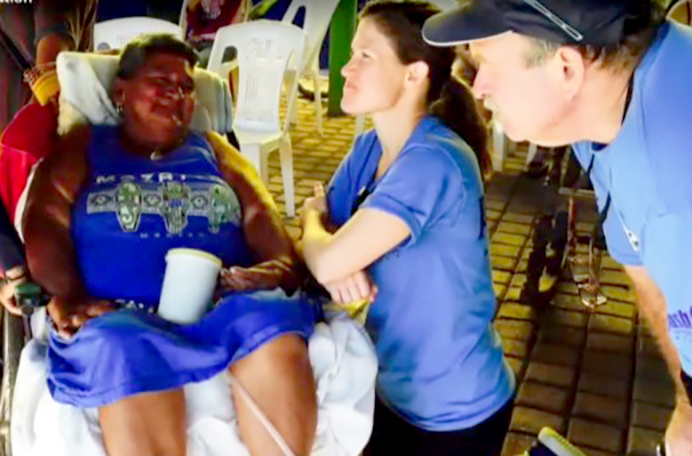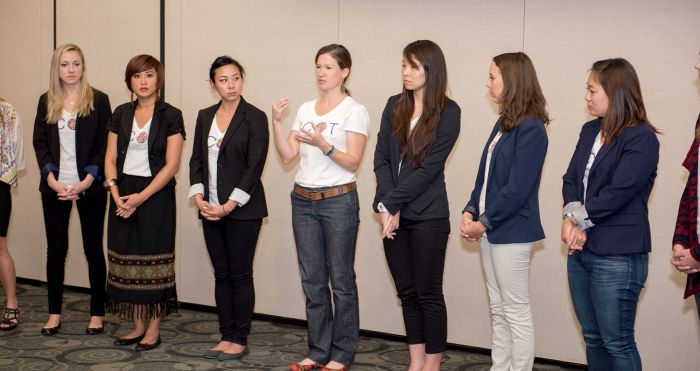
Laurelin Hefter was uneasy around children, an admission she shared with her fellow California State University, Dominguez Hills (CSUDH) Master of Science Occupational Therapy (MSOT) students during their recent fieldwork trip to Mazatlán, Mexico, to help provide care and wheelchairs to children and adults with disabilities.
Adding to her apprehension was that the team would also be working with kids suffering from severe Cerebral Palsy. She was unsure how to interact with them or if she could temper her reaction to their body movements or drooling, which is often associated with the disorder. But those concerns proved fleeting after she began holding their bodies close to hers.
“I quickly began to understand that yes, they may not be able to move volitionally, but that they are warm and smart people inside–like all of us–and they are children who deserve the right to play,” she said. “I also realized that playing with them is a just thing to do. That was the point of the trip, to bring occupational justice to populations that don’t have it.”
Hefter was one of 10 MSOT students who participated in the five-day fieldwork trip to Mazatlán, which was a collaboration between the CSUDH’s Department of Occupational Therapy (OT), the student club Integrated Cultures through Occupational Therapy (ICOT), and the International Education Center. The students and Diane Mayfield, the MSOT program’s academic fieldwork coordinator who led the group to Mexico, recently shared their experiences during a presentation in the Loker Student Union ballroom.
The talk not only covered the fieldwork they did, but also how the students researched and found a place that was a good fit for them and their mission. The team also wanted to share with other groups on campus the extensive amount of time, paperwork and organization required in coordinating such learning experiences, as well as numerous opportunities to gain alternative knowledge on such a trip.
After we gave her the wheelchair she just burst into tears of happiness.

“Traveling to other countries gives students the ability to see OT in much more unique cultural settings,” said Mayfield. “They also get to see outside the box and learn about things beyond OT, such as the different types of documentation required to organize such a project, and learn about how healthcare systems all over the world function.”
The students coordinated their fieldwork trip through the non-profit PUSH International, an international volunteer organization that provides wheelchairs and “sustainable mobility” for people with disabilities who are among the “poorest of the poor.” The organization shares a secure campus in Mazatlán with Asociación de Padres y Compadres (IAP), a local non-profit rehabilitation center for persons with disabilities.
PUSH acquires used and new wheelchairs in the U.S. throughout the year, then sends them to Mazatlán in a truck where groups, such as the MSOT students, customize and “seat” each patient during wheelchair “distribution week,” which culminated on Thursday–distribution day.

The first few days of distribution week is when the MSOT students worked with the children in the on-campus rehabilitation center. They also assisted during equestrian therapy, conducted rural home visits to deliver mobility equipment, toured a hospital, attended a lecture on neuro-developmental treatment, and benefitted from interaction with medical doctors, social workers and nurses.
MSOT student Laura Gonzalez enjoyed working and interacting each day with the social workers and physical therapists at the center, as well as the kids who received services there. She also liked working with tools and getting her hands dirty.
“We were introduced to different types of wheelchairs; how to put them together and take them apart. You have to be flexible, and figure out on-the-fly how to use the different parts,” said Gonzalez. “Then during distribution day, adults were coming in and we fitted wheelchairs to them. It was just an amazing experience.

“You can see in the photo [in a PowerPoint shown during the presentation] that I’m giving Margarita a smooch,” Gonzalez added. “She came in with a wheelchair that was broken down and had a wooden board supporting it. We were able provide her an appropriate chair that gave her the proper support she needs. We were also able to send her home with a shower wheelchair, because previously they were bathing her on the ground.”
Megan Dominguez, MSOT student, also had several memorable and heartwarming experiences working at the campus, including working with a paraplegic woman who was paralyzed from the waist down and lacked the resources to get a wheelchair. To move around, she was forced to use a sit-down walker, pushing it one step at a time and then sitting down, over and over again.
“Not being in the right adaptive equipment is very uncomfortable. After we gave her the wheelchair she just burst into tears of happiness. She was just so thankful and grateful for the chair because she was in a lot of pain,” said Dominguez. “A lot of people in that community don’t have access to these types of services, so it was very nice to be able to help her out in that way. She just kept saying, ‘God bless you!, God bless you!, God bless you!’”
The other MSOT students who participated in the fieldwork in Mazatlán were Rachelle Buenviaje, Anna Cheng, Amy Chu, Meredith Palmer, Michelle Savarese, Kelly Archer, and Emily Crizer.